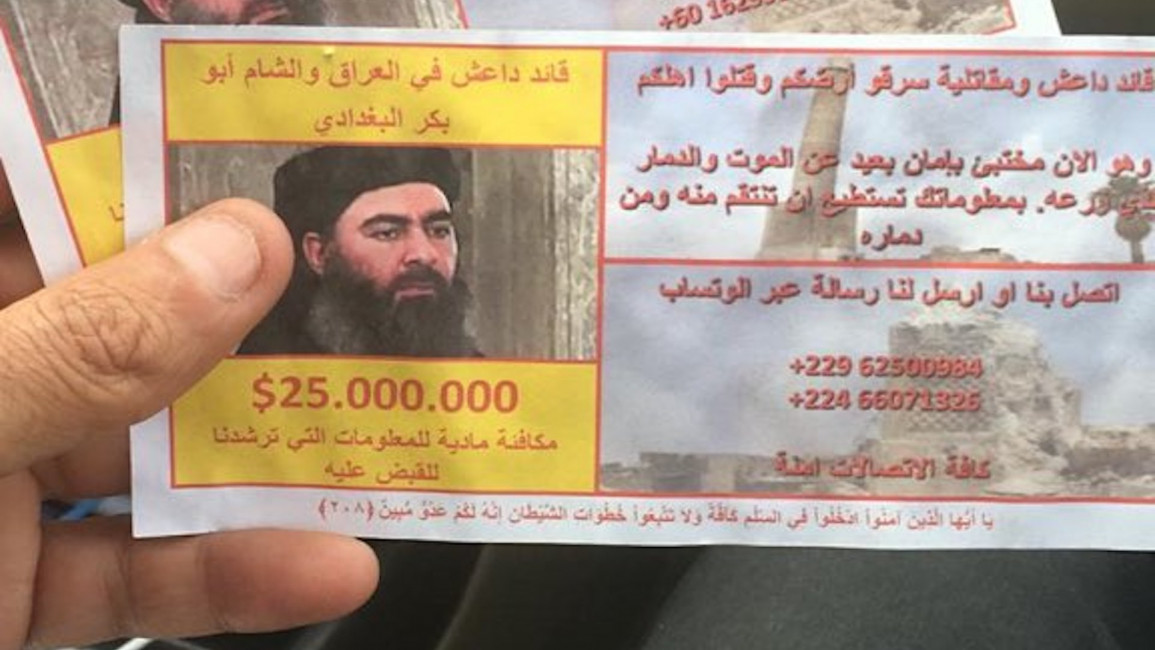Exclusive: US warplanes drop $25-million reward leaflets for Abu Bakr al-Baghdadi's head
The planes dropped the leaflets Wednesday morning over Upper Euphrates towns, bedouin encampments, and villages adjacent to the borders with Syria, Jordan and Saudi Arabia, according to Anbar Province police sources.
The leaflets carried pictures of Baghdadi and a promise of a reward of $25 million in return for information about his location.
"Tens of thousands of leaflets bearing the image and name of Baghdadi, and non-Iraqi mobile phone numbers belonging to the international anti-IS coalition, were scattered at dawn over the Anbar desert fanning out to Iraq's borders with neighbouring countries," a colonel in the Iraqi police in the province told The New Arab Arabic service's correspondent.
|
The 'wanted posters' claimed Baghdadi was hiding in safety, suggesting the coalition is aware he remains alive.
Dozens of locals in the towns of Hit and al-Rutba in western Anbar were seen gathering the leaflets from their roofs and redistributing them.
"This is where Baghdadi and his gang killed dozens of youths accused of apostasy," said Ayham Abdullah, a local resident of Hit.
"We hope he and his men will be executed for their crimes".
Baghdadi has been in the past rumoured dead following American and Russian airstrikes, but US and Iraqi forces continue to hunt him down in the porous desert regions straddling Iraq's western and southern borders, where he is believed to be still hiding.
US Special Forces have been enlisted in the search for the chief of the Islamic State militant group in Iraq, a senior Iraqi military official revealed to The New Arab back in January.
That was before IS' last remaining enclave in Syria's Baghouz fell to US-backed forces last month, bringing an end to his self-declared caliphate and sending IS holdouts into hiding.
 |
Baghdadi and his fighters split with al-Qaeda and pursued an ultraviolent form of extremism that included bringing back slavery, engaging in genocide on non-Muslim minorities and Shia Muslims, and applying an extreme version of Islamic capital punishments |  |
Who is Abu Bakr al-Baghdadi?
Baghdadi has been rumoured dead many times. A character shrouded in mystery, making only one public appearance in 2014, Baghdadi's real name may be Ibrahim Awwad Ibrahim al-Badri, and he may have been born in 1971 in Samarra, an ancient Iraqi city in the so-called Sunni Triangle north of Baghdad.
He may have been a cleric in a mosque in the city around the time of the US-led invasion in 2003. Reports suggest he was radicalised during the four years he was held at Camp Bucca, a US prison in southern Iraq where many al-Qaeda commanders were detained.
He emerged as the leader of al-Qaeda in Iraq, one of the groups that later became Islamic State of Iraq and the Levant (ISIS) in 2010 and then Islamic State (IS) in 2014, and rose to prominence during the failed merger with al-Qaeda-linked Nusra Front in Syria (now Jabhet Fateh al-Sham).
He did not swear allegiance to the leader of the al-Qaeda franchise, Ayman al-Zawahiri, who had urged IS to focus on Iraq and leave Syria to al-Nusra.
Baghdadi and his fighters split with al-Qaeda and pursued an ultraviolent form of extremism that included bringing back slavery, engaging in genocide on non-Muslim minorities and Shia Muslims, and applying an extreme version of Islamic capital punishments, involving live immolation and mass beheading.
The group and lone wolves inspired by it have claimed numerous terror attacks from the US to the Philippines, via Europe and the Middle East.
In 2014, following his group's rapid capture of Mosul and vast swathes of western Iraq, he declared himself from the pulpit of al-Nuri Mosque in the Old City of Mosul the new caliph, leader of the entire Muslim nation, a title abolished in 1924 with the fall of the Ottoman Empire.
Follow us on Twitter: @The_NewArab



